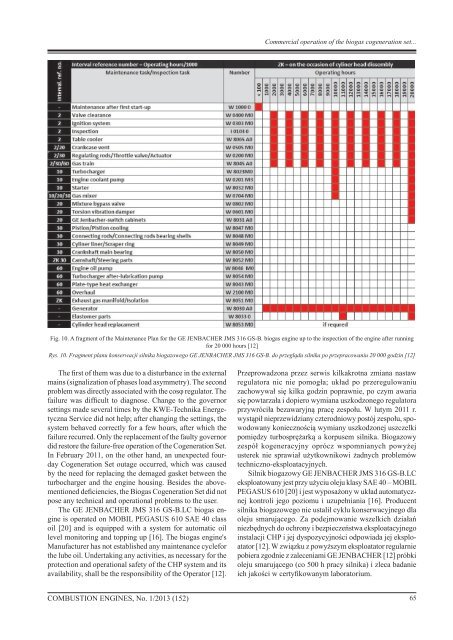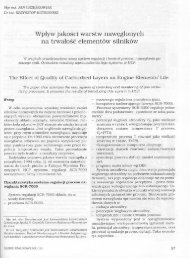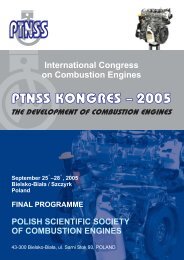You also want an ePaper? Increase the reach of your titles
YUMPU automatically turns print PDFs into web optimized ePapers that Google loves.
Commercial operation of the biogas cogeneration set...<br />
Fig. 10. A fragment of the Maintenance Plan for the GE JENBACHER JMS 316 GS-B. biogas engine up to the inspection of the engine after running<br />
for 20 000 hours [12]<br />
Rys. 10. Fragment planu konserwacji silnika biogazowego GE JENBACHER JMS 316 GS-B. do przeglądu silnika po przepracowaniu 20 000 godzin [12]<br />
The first of them was due to a disturbance in the external<br />
mains (signalization of phases load asymmetry). The second<br />
problem was directly associated with the cosφ regulator. The<br />
failure was difficult to diagnose. Change to the governor<br />
settings made several times by the KWE-Technika Energetyczna<br />
Service did not help; after changing the settings, the<br />
system behaved correctly for a few hours, after which the<br />
failure recurred. Only the replacement of the faulty governor<br />
did restore the failure-free operation of the Cogeneration Set.<br />
In February 2011, on the other hand, an unexpected fourday<br />
Cogeneration Set outage occurred, which was caused<br />
by the need for replacing the demaged gasket between the<br />
turbocharger and the engine housing. Besides the abovementioned<br />
deficiencies, the Biogas Cogeneration Set did not<br />
pose any technical and operational problems to the user.<br />
The GE JENBACHER JMS 316 GS-B.LC biogas engine<br />
is operated on MOBIL PEGASUS 610 SAE 40 class<br />
oil [20] and is equipped with a system for automatic oil<br />
level monitoring and topping up [16]. The biogas engine's<br />
Manufacturer has not established any maintenance cyclefor<br />
the lube oil. Undertaking any activities, as necessary for the<br />
protection and operational safety of the CHP system and its<br />
availability, shall be the responsibility of the Operator [12].<br />
Przeprowadzona przez serwis kilkakrotna zmiana nastaw<br />
regulatora nic nie pomogła; układ po przeregulowaniu<br />
zachowywał się kilka godzin poprawnie, po czym awaria<br />
się powtarzała i dopiero wymiana uszkodzonego regulatora<br />
przywróciła bezawaryjną pracę zespołu. W lutym 2011 r.<br />
wystąpił nieprzewidziany czterodniowy postój zespołu, spowodowany<br />
koniecznością wymiany uszkodzonej uszczelki<br />
pomiędzy turbosprężarką a korpusem silnika. Biogazowy<br />
zespół kogeneracyjny oprócz wspomnianych powyżej<br />
usterek nie sprawiał użytkownikowi żadnych problemów<br />
techniczno-eksploatacyjnych.<br />
Silnik biogazowy GE JENBACHER JMS 316 GS-B.LC<br />
eksploatowany jest przy użyciu oleju klasy SAE 40 – MOBIL<br />
PEGASUS 610 [20] i jest wyposażony w układ automatycznej<br />
kontroli jego poziomu i uzupełniania [16]. Producent<br />
silnika biogazowego nie ustalił cyklu konserwacyjnego dla<br />
oleju smarującego. Za podejmowanie wszelkich działań<br />
niezbędnych do ochrony i bezpieczeństwa eksploatacyjnego<br />
instalacji CHP i jej dyspozycyjności odpowiada jej eksploatator<br />
[12]. W związku z powyższym eksploatator regularnie<br />
pobiera zgodnie z zaleceniami GE JENBACHER [12] próbki<br />
oleju smarującego (co 500 h pracy silnika) i zleca badanie<br />
ich jakości w certyfikowanym laboratorium.<br />
<strong>COMBUSTION</strong> <strong>ENGINES</strong>, No. 1/2013 (152)<br />
65












